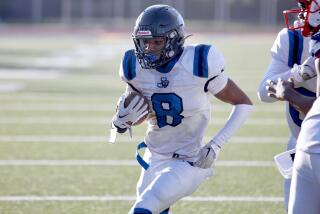Academic Uncertainty Clouds College Choice of Crespi’s White
- Share via
When the Feb. 8 national signing day for high school football players arrives, one important voice in the Valley-area crowd might be silent.
Russell White, the state’s all-time leading rusher, may postpone his college decision indefinitely, largely because of uncertainty over academics. White, who carries a B average in college preparatory classes at Crespi High, has failed to reach the minimum requirements spelled out by the National Collegiate Athletic Assn. on his Scholastic Aptitude Test.
Under the guidelines of Proposition 48, which took effect in 1986, high school student-athletes must achieve a 2.0 grade-point average and a 700 SAT score to ensure freshman eligibility.
White, 18, who has taken the test twice, will take the SAT again Jan. 27 but will not receive the results before Feb. 8, the first day high school athletes can sign letters of intent. White can continue to take the test until June.
The uncertainty about academics has clouded White’s recruitment picture. White, whose uncle, Charles White, won the Heisman Trophy at USC, had touted the Trojans as his No. 1 choice at the start of the ’88 season. White said this week that the Trojans were no longer No. 1 and that the field is wide open among USC, Cal, Notre Dame and Washington. He visited Cal last week and will take trips to the other schools before deciding. He has eliminated Penn State from consideration.
Cal and Washington have never had a Prop. 48 football player, but the recruiting coordinators at both schools said that there is no policy against Prop. 48 players. Notre Dame quarterback Tony Rice, who led the Irish to the national title last season, lost his freshman year of eligibility because he did not meet Prop. 48 requirements.
Linebacker Junior Seau is USC’s only Prop. 48 football player, and he may be the last because of an anti-Prop. 48 sentiment within the athletic department.
If White fails to meet the 700 SAT requirement, he might attend a Valley-area junior college. But he said that he would not play football in order to retain 4 years of athletic eligibility. Four-year colleges may offer scholarships to students who fail to meet the NCAA requirements, but the athletes lose a year of eligibility. If a student-athlete pays his own expenses for a year he can retain his 4 years of eligibility but must sit out his freshman year.
At least one observer believes White’s problems shortly will become, well, academic.
“Russell got good grades at Crespi and he earned them,” said Bill Redell, who resigned as coach at Crespi after last season. “Russell’s got plenty of time to take the test again, and I think he’s going to pass.”
More to Read
Get our high school sports newsletter
Prep Rally is devoted to the SoCal high school sports experience, bringing you scores, stories and a behind-the-scenes look at what makes prep sports so popular.
You may occasionally receive promotional content from the Los Angeles Times.






